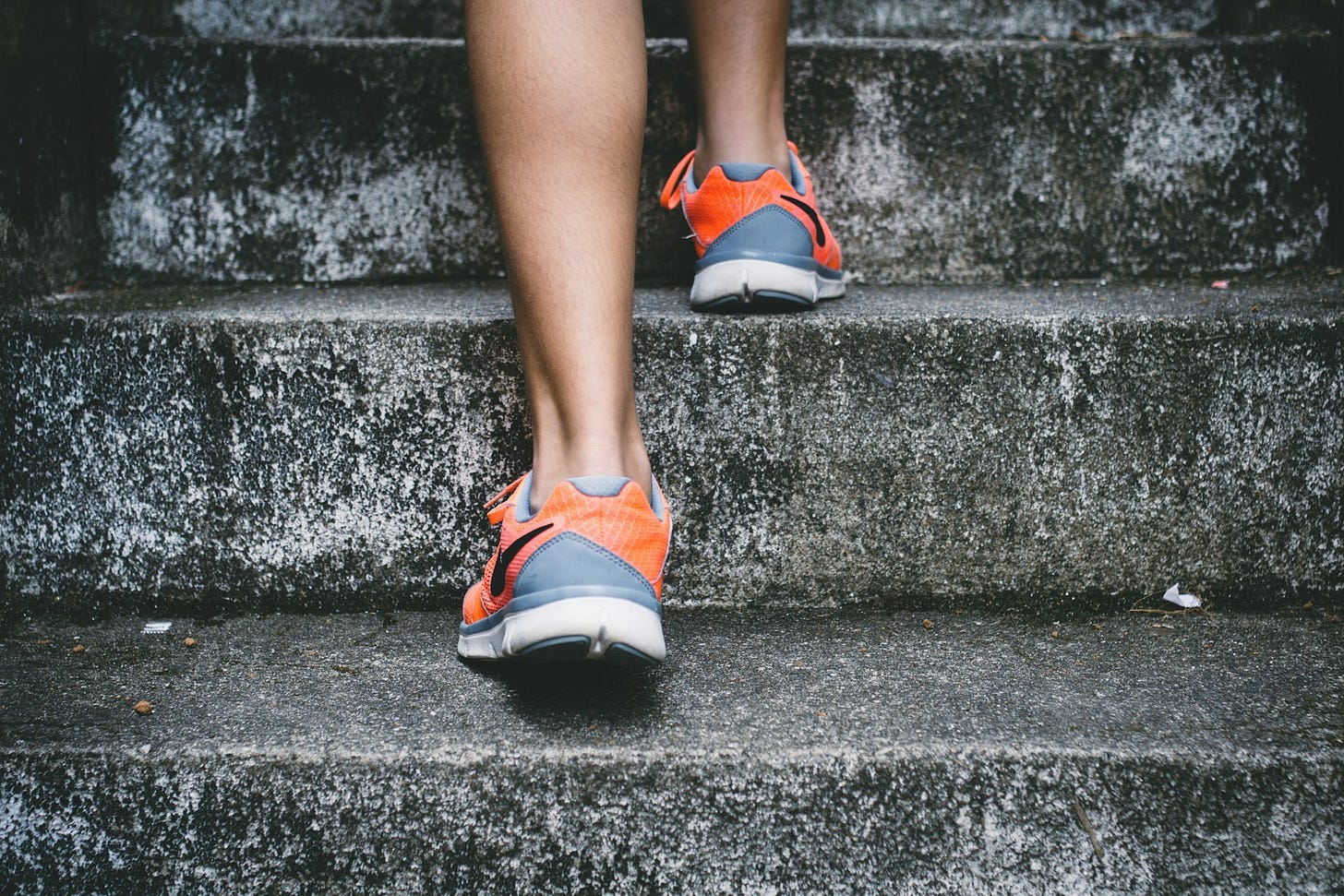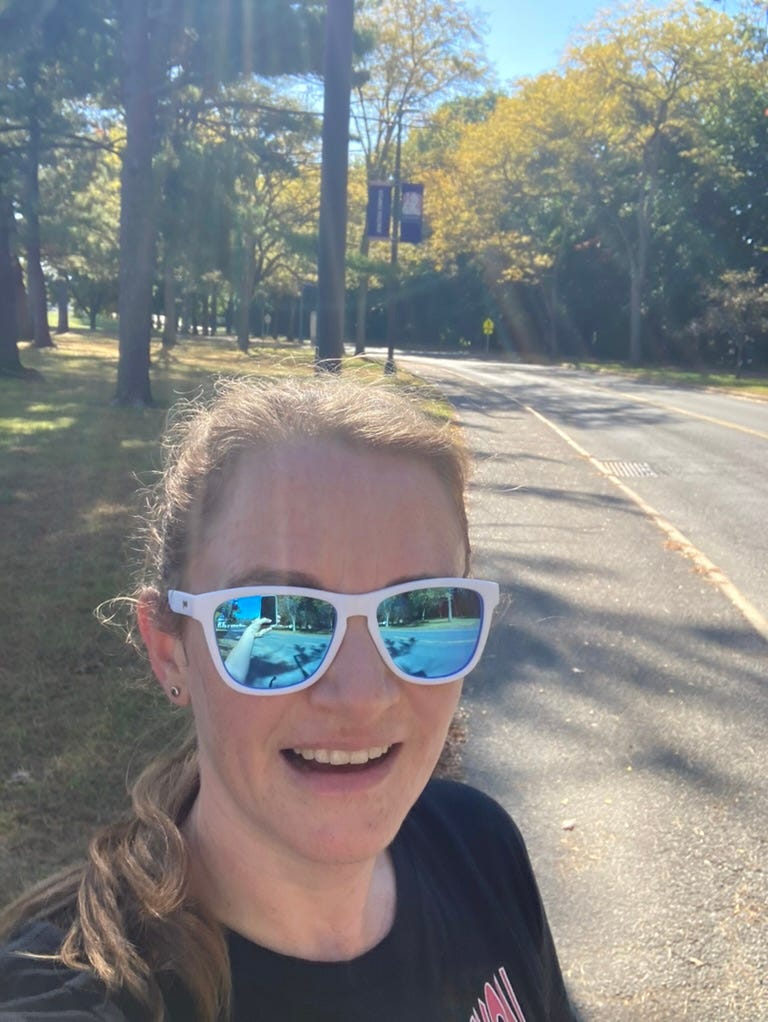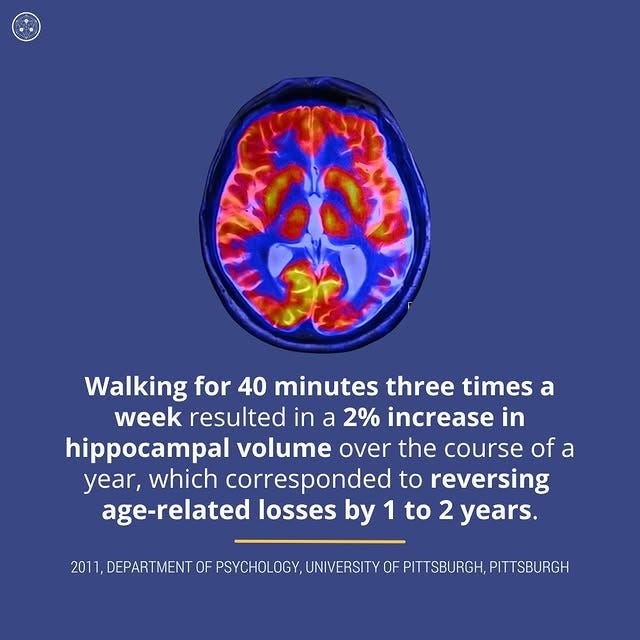Struggling to Stick to Your New Year's Resolution to Exercise? Let Dementia Prevention Be the Motivation You Need
Physical activity is the most powerful tool you have to protect your brain.

This newsletter usually focuses on travel in the Northeast U.S., but I’m trying something new—sharing one wellness article each quarter. This is a topic I’m particularly passionate about.
Every January, millions of Americans vow to save money, eat better, and move more—the top three resolutions year after year. While I don't have any magical advice for helping you stay consistent with the first two, I do have some unexpectedly powerful motivation for exercise: Do it for your brain.
I was inspired to write and send this now because I came across the widely cited claim that 80% of New Year's resolutions fail by the end of February. It turns out, there's actually no solid source for that! Does it even matter, though? We all know from experience that most resolutions fizzle out by spring.
Plus, where I live in upstate New York, staying motivated at this time of year is particularly difficult when high winds, slushy sidewalks, and lots of rain and mud make exercising outside feel impossible while simultaneously deterring you from leaving your house to go to the gym.
Exercise isn’t about diet culture
Another reason this feels prescient: I don't know about you, but in my corner of the internet, I've noticed more and more conversations pushing back against "fitness culture" and "gym bros.”
Look, I get it. Fitness people can be annoying. Many of them post their every rep on social media, claim "ice cream" made with protein powder is just as good as the real thing (it's not, believe me), and make working out into a performance rather than something you just do. Diet culture has also made the conversation around exercise more complicated than it needs to be.
But here’s what everyone misses: Exercise isn’t about diet culture, weight loss, or aesthetics. That’s just how the fitness industry sells it to us to get us in the door.
The promise of "looking better" motivates plenty of people in the short term, but it’s a terrible long-term strategy. Plus, exercise feels kind of awful when you’re just starting out. Progress is slow, the payoff seems far away, and it’s so easy to quit.
I know this because I spent years stuck in that cycle myself.
How my relationship with fitness has evolved

I didn’t always exercise consistently. In fact, for most of my 20s, I repeated the same routine over and over again. I’d run for a few weeks or join a gym. Inevitably, I’d quit. And every time, I’d feel like a failure. I now realize I wasn’t the problem—the way I thought about exercise was.
Like most people, I only saw it as a way to shrink my body or “tone up.” When I didn’t see quick results, I lost motivation. The workouts felt pointless, so I’d convince myself that exercise just wasn’t for me. Articles like these, which maintain exercise isn’t that effective for weight loss, didn’t help.
At some point, I even started priding myself on NOT exercising—like it was a personality trait. I told myself I just didn’t enjoy getting out of breath. Why push myself if there wasn’t a clear reason?
The wake-up call that made me rethink exercise
I won’t sugarcoat it: I only started exercising consistently because of fear.
When my mother’s Alzheimer’s became undeniable (in hindsight, her symptoms likely began around 67), and I accepted that nothing could stop it, I started devouring everything I could find on brain health.
That’s when I learned dementia begins 20 to 30 years before symptoms appear, meaning changes could have started in her brain as early as her late 30s, the same age I was at the time.
But a quote from Dr. Richard Isaacson, founder of the country’s first Alzheimer's Prevention Clinic at Weill Cornell Medicine, stopped me in my tracks:
“Exercise is, by far, the number one thing a person can do to reduce their risk.”
I remember hearing that and wondering, “Why doesn’t everyone know this?” I certainly didn’t. It made me realize that neglecting exercise could be gambling with my long-term health.
That realization changed everything. Finally, I had the motivation I needed to start exercising consistently.
We evolved to move

The human brain makes up just 2% of our body weight, yet it burns 20% of our energy, far more than most animals. What’s all that brainpower for, you ask?
Not for writing this Substack. Not for doom-scrolling. No, not even for solving crossword puzzles or Sudoku (sorry, I have a personal vendetta against the “puzzles prevent dementia” myth, which I’d like to cover here or elsewhere at some point.)
Neuroscientist Daniel Wolpert puts it bluntly in his Ted Talk:
"We have a brain for one reason and one reason only, and that's to produce adaptable and complex movements."
Our modern world is designed for sitting, but our biology hasn’t caught up. Take our closest relatives—apes. Unlike humans, they can get away with minimal movement and still avoid diabetes, high blood pressure, or heart disease, even in captivity.
We’re built differently. When we stop moving, our bodies—and our brains—pay the price. In an article for Healthline, I spoke with a few experts and covered research showing that exercise is one of the most powerful ways to protect brain health. Here’s why:
It slows brain shrinkage. Without movement, we lose 1% of brain matter per year after 40.
It reduces inflammation, a key driver of cognitive decline.
It boosts brain-derived neurotrophic factor (BDNF), which helps neurons stay alive. Many scientists even call this protein “Miracle-Gro for your brain.”
It protects against stress. Too much cortisol from chronic stress damages brain cells and accelerates decline.
Recent studies have also shown that just 30 minutes of exercise can boost your memory for 24 hours, enhance both short-term and long-term recall, improve attention and focus, and sharpen your reaction times.
The connection between exercise and brain health isn’t just theory—I’ve experienced it firsthand. Since committing to consistent, vigorous movement, my memory has sharpened, my energy levels have improved, and my depression is under control.
When I skip a few days, I feel the difference.
We need movement to stay healthy
Do I always love working out? Absolutely not. Some days, I dread it. However, it’s a small price to pay for feeling good throughout the day, sleeping soundly at night, and giving myself the best shot at staying healthy and independent well into retirement.
Of course, I know exercise isn’t a magic shield. Many things in life are out of our control. But after watching a loved one fade away from an absolutely horrifying disease, why wouldn’t I give myself a fighting chance of avoiding that same fate? So, when I look at my family tree, it's clear that skipping exercise isn’t an option for me.
Honestly, given all the evidence about exercise’s health-boosting benefits, it shouldn’t be an option for most people. Yet 77% of Americans don’t get enough physical activity, according to the latest CDC data.
I get why. Modern life makes it incredibly inconvenient to move. Between car-dependent communities, long work hours, and endless commutes, it often feels like society was intentionally designed to keep us sitting. And for those with physical disabilities or chronic illness, it’s even harder.
Still, the fact remains: We need movement to stay healthy. Sure, vigorous exercise is likely more beneficial, but something is always better than nothing. “The benefits of exercise begin with any amount of activity north of zero—even brisk walking—and go up from there,” writes popular longevity expert Dr. Peter Attia in his book Outlive.
Even just 10 minutes a day improves brain function, which is why I have to agree with Mikala Jamison when she writes in a piece titled Is 'exercise' a bad word now? for the Body Type newsletter:
"I do believe, truly, that everyone can fit at least 10 minutes of exercise into their day. Maybe some people will be incensed by that assertion. Cancel me, I guess, for believing in you."
Because at the end of the day, movement is essential. It should be as natural as breathing, as routine as brushing our teeth. Beyond brain health, exercise supports nearly every system in the body. It strengthens the heart and lungs, regulates blood sugar, and boosts mental well-being.
No wonder Dr. Robert N. Butler, founding director of the National Institute on Aging, once wrote:
“If exercise could be packed into a pill, it would be the single most widely prescribed, and beneficial, medicine in the nation.”
That doesn’t mean it should replace medicine (I’ve never understood why some people act like it’s either-or). Movement is just one crucial piece of the puzzle that most of us can’t afford to ignore.
What I’ve written recently
AAA Northeast, Best Ski Resorts for Beginners in the Northeast
Hone Health, Struggling with Anxiety During Menopause? HRT Might Help
AFAR, Journeys Itineraries for Aruba: Romance, Food, Family, and Wellness
Hone Health, New Studies Say Mitochondria May Be Key to Healthy Aging—Here’s How
Hone Health, Does Creatine Cause ED?
Hone Health, The Emotional Symptoms of Perimenopause Are Real
AAA Northeast, Where to Go Whitewater Rafting in the Northeast
Wine Enthusiast, What’s the Difference Between Wine Grapes and Table Grapes?
Matador Network, A Sustainable Travel Guide to Vermont’s Legendary Green Scene
Wine Enthusiast, The Best Wineries (and More) to Visit in Maryland Right Now
Matador Network, 4 Vermont Road Trips Perfect for Your EV
How to work with me
Editors at consumer and industry publications: Check out my portfolio to see a selection of articles (covering travel, food, health, and wellness) I’ve written for over 40 different outlets.
Branded content editors: Discover how I’ve partnered with 20+ brands to create engaging sponsored articles, blog posts, email newsletters, social copy, and more.
Marketing pros at lifestyle brands: I can assist with your marketing efforts by creating articles, blog posts, email newsletters, travel itineraries, web copy, and social media copy tailored to your brand. I also offer editing services.





